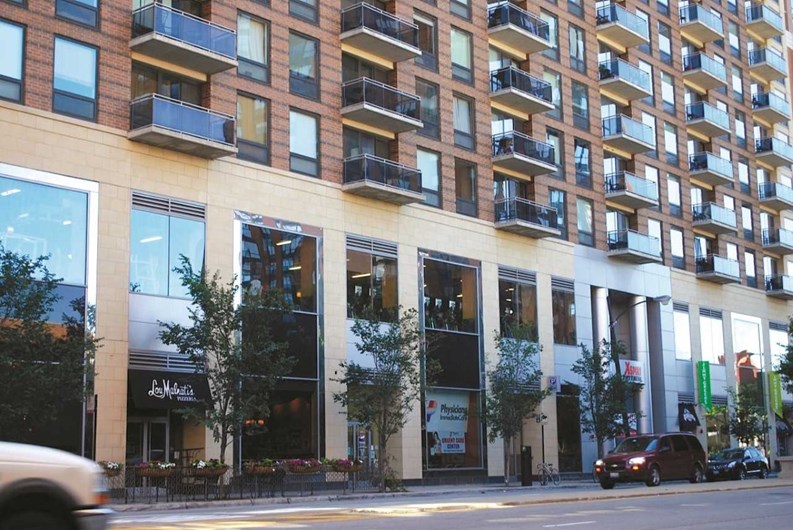Stores and other commercial businesses on the ground floor of a condo building used to be a rarity but now they are becoming a hot new amenity, even a standard for newer buildings. Restaurants, food markets, drugstores, clothing stores, gyms and offices are occupying more space in residential buildings than ever before.
Why are businesses seeking out space in condos? A recent Business Week article proclaimed that for the first time in 20 years, cities are growing faster than the suburbs with neighborhoods tripling in size in the last decade—the Loop's population has ballooned to 20,000 in the past 10 years. With more residents in smaller spaces, retailers are looking to attract and expand their businesses.
“I would say that buildings that were constructed from 2002 to 2010, many of them do have commercial tenants,” says Nancy Ayers, senior managing director at Mesirow Financial in Chicago. “It's going to add revenue to the building. It's also a convenience for the unit owners because many of the retail tenants are geared for servicing the building and realtors may even consider it a selling point.”
Commercial occupancy in condo buildings is also occurring in the suburbs. “It's gaining popularity all over, besides Chicago proper itself. The suburbs, especially some of the nicer suburban areas, are building condominium structures in their downtown markets and almost all of them have restaurants on the first floors or retail,” says John Saisi, president of the John L. Saisi Insurance Agency in Arlington Heights. “One building that I know has two restaurants, a spa, a cleaner on one side of the building. The first floor is probably half commercial tenants, half parking spaces,” he says.
The relationship between the condo and the ground-floor business tenant is a complicated one. Having these stores on the ground floor is often seen as a plus by unit owners. But for management, it can raise questions. This article will review this relationship from the standpoint of insurance, an important item for any residential building.
Tenant Types
What kind of business is the ideal commercial tenant? The answer depends on the age of the building itself as well as the demographic of the residents. Newer buildings are better equipped to serve commercial tenants, thus not restricting the type of tenant that can move in.
“Buildings are built right. In the old days, if you had commercial on the first floor, let's say it was a restaurant. The ventilation was poor, gases would get up into the residences and that's not good. The way they are structured now, everything is concrete with steel floors and separate ventilation systems. It's a lot easier to insure, it's a lot safer and it's very aesthetic the way they design these today,” says Saisi.
A “higher-risk” tenant such as a restaurant, if it is properly managed, can be a great amenity for a residential building. “It is not always bad to have a restaurant as a tenant,” says Patrick Kennelly, chief executive officer of Phoenix Rising Management Group, Ltd. in Chicago. “Granted, a restaurant poses different challenges and the restaurant brings into play different operational dynamics. For example, restaurants obviously create greater foot traffic and almost all need to provide valet parking. These byproducts of the restaurant business can be disruptive to the operations of the association and can create security issues. However, these are manageable issues.”
That's not to say that every building should consider a leasing their space to a fast food chain or bistro. Ayers says that restaurants still pose more of a liability risk and need to be better protected depending on what kind of cooking they are doing. “I've noticed that if you're working at a smaller building, let's say a four flat or a six flat, there are some insurance companies that won't write the building if they have a restaurant,” she says.
Older structures may not have the space or the resources for a commercial tenant and thus are harder to insure.
“The older buildings, and I will say that in Chicago there's a lot of older buildings that are very well-kept, but they're not fire resistant—they're joint masonry, and it's very difficult to insure those buildings because of that. But you don't see a lot of those converted because there's only three or four units in the buildings anyway. But those would be harder to insure. You can insure almost anything but there is a market out there that will charge whatever is necessary to take on the risk. But for the majority of the condo associations that we look at, they're structurally sound. Most of them that aren't fire resistant or masonry non-combustible don't have commercial tenants on the first floor that would offer any inherent fire risk. They wouldn't have restaurants, for instance,” explains Saisi.
What Kind of Insurance?
What kind of insurance do condos need if they have commercial tenants? Several answers come to mind. Ayers suggests that the first place to look would be would be the “easement agreement,” which gives someone the right to use property for a specific purpose without transferring the ownership of the property.
“You need to check the easement agreement to see what the insurance requirements are. Typically, when you have the commercial part of the building and a residential part of the building, there's an easement agreement spelling out the responsibilities of each party,” she says. “Some insurance requirements may require that the building is insured with the same company. Some may require building and liability, or they may just require that both of them have insurance, and then they add each other as additional insurers.”
Robert Bachmann, vice president of Crissie Insurance in Des Plaines, notes that typically insurance companies cannot insure two different owners of a building, which is why the easement agreement is established. “Typically what happens is that the most cases, the condominium association, which could be the upper floors, buys the insurance for the lower commercial floors,” he says.
Saisi adds that insurance for a building with commercial tenants may not be as high as expected because “those [spaces] are only operating during certain hours of the day. The residential, they're occupying it all the time.”
“I think years ago, we didn't understand the commercial tenancy aspect of it, outside of a pure rental building. But now that you can actually own a commercial space, these are owners and there's private ownership, so the premiums have probably actually gone down for those types of buildings in the north in the last 10 years because of the ownership aspect,” he says.
From the perspective of the tenant, the type of insurance that is required will depend on the type of business it is and what local government regulations dictate—meaning not all policies will be created equal.
“There are a lot of things to consider, so normally it can't be a carved-out policy. It has to be a policy that will sustain itself and sustain the building if anything happens. For example, the cleaners, you know they need other coverage, a special package for them because they have property of others that's under their control,” Saisi says.
In general, both the building and the tenant want to make sure they are adequately covered and there are no gaps in coverage.
“The tenant would have a policy covering the space and their business, and then the commercial owner would have a policy covering their space as a building owner. So let's say it was a condo unit, they would still have to have just have a business policy covering their space,” says Ayers.
Fire or Accident
What happens if the co-op or condo building is damaged as a result of a fire or other mishap in the tenant’s business—say, a fire in a restaurant’s ventilation system?
“Property coverage is going to cover the portion of the building that the tenant occupies, for the tenant, if they're purchasing property coverage. If they're negligent, there may be some responsibility, but again, it's going to go back to that easement operating agreement that spells out who's responsible for what. Typically, the condo is responsible for the condo building and the commercial owner's responsible for the commercial portion of the building,” Ayers says.
Once the Commercial Tenants Is In
So far, we’ve just talked about the insurance needs of the building or development. But there are also important considerations for the board before and after a commercial tenant is in.
“Typically from the insurance perspective, it's ‘tell me about your operation. What do you do?’ You have to be able to understand what they do, how much sales they expect, what kind of volume they expect, who they are going to sell to. Is it just us as the building or is it going to be other people? We want to know a little bit about their financial strength because we want to make sure they pay their premium,” Bachmann says.
Once the commercial tenant is in a residential building, experts say, it’s up to the condo or co-op board or manager to decide the appropriate insurance coverage for that tenant—with the assistance of the insurance broker, attorney and/or management company.
Another important issue is what type of insurance information the business tenant needs to provide to a building’s board and legal professionals before signing a lease.
Bachmann says that parties should exchange a certificate of insurance, which is a one-page snapshot of the liability insurance. “Let's assume that there's an agreement to say that they have to show each other that they have insurance. Once a year when the individual's insurance renews, they have to ask their agent to send over the certificate of insurance and evidence of property insurance and they get to review it to make sure they have the proper limits,” he says.
Additionally, Saisi stresses the importance of the board sitting down to review each policy to ensure that all space is properly protected.
“If I'm sitting on the board of directors, I certainly want to sit down and make sure I review their policies. As an insurance agent, I will sit down with my boards of directors of certain buildings that we have and we'll go over their commercial tenants' policies to make sure that they actually have the coverages that they need and just make sure that they're continually in place. Because a condo association's policy is going to have to answer to things that aren't covered elsewhere. And we want to ensure that those things are all in place,” he says.
The Building Manager’s Role
In a mixed-use building that contains both unit owners and commercial tenants, the manager acts as an intermediary between all owners and/or tenants, just like he or she does in a totally residential building.
Very generally, the property manager's role is to “ensure that they work closely with the association’s counsel to understand the legal terms [of the governing documents] and then to work closely with the commercial space tenant to ensure compliance with the easement rights, duties and responsibilities between the parties,” says Kennelly.
From an insurance standpoint, the property manager or management company should be prepared to offer their expertise about insurance, city codes and regulations, alterations and other matters to the commercial tenants, and should always be accessible, says Saisi.
“They have to be well- attuned to all the laws and the changes, they happen so quickly, so that they can make sure that the condo act is being met,” he says.
Most of the time, when the business is a tenant of the condo building itself, the manager will have to deal with repair issues, rent collections and lease renewals, just like a manager does in a residential rental building. But when a building’s commercial space is owned by another entity, then leased to the store or business, the manager will have less of a role.
Raanan Geberer is a freelance writer and a frequent contributor to The Chicagoland Cooperator. Editorial Assistant Maggie Puniewska contributed to this article.







Leave a Comment